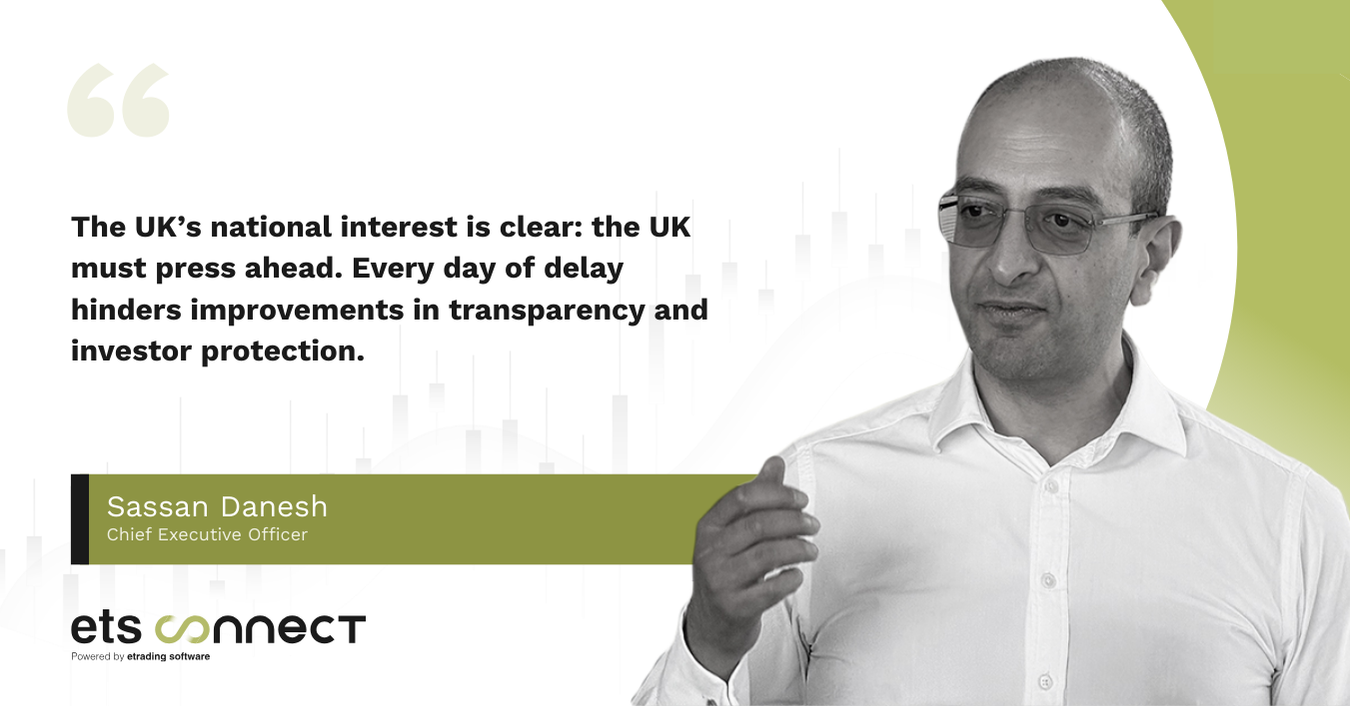
Building the UK’s Data Infrastructure: Why We Must Urgently Move Forward with the Bond Consolidated Tape
The UK’s capital markets stand at a crossroads. The bond consolidated tape (CT) is a once-in-a-generation opportunity to strengthen transparency and competitiveness. As CEO of Etrading Software, I want to speak candidly about the current situation. The FCA’s award of this contract to Etrading Software, which I consider followed a fair and transparent procurement process, has unfortunately been suspended due to a legal challenge from Ediphy. While I fully respect the right to legal recourse, a prolonged delay risks undermining the UK’s strategic objectives to increase the competitiveness of UK markets. Importantly, lifting the suspension would not prevent Ediphy from continuing with a legal claim in parallel — it would simply allow the UK to move ahead with vital infrastructure while the court process takes its course.
The consolidated tape is not a “nice-to-have.” It is a cornerstone of the UK’s Edinburgh Reforms and Wholesale Markets Review, which explicitly identified the CT as a priority reform to ensure greater market transparency. Just as roads, housing, and energy grids are vital to physical commerce, market plumbing such as the CT is vital to the functioning of modern financial markets. Yet, much like infrastructure projects that are frequently delayed and rendered more costly by litigation, we now face the irony of the UK’s critical financial data backbone being held back by the very challenges the UK government is actively trying to reduce in other sectors.
The UK’s national interest is clear: the UK must press ahead. Every day of delay hinders improvements in transparency and investor protection. Worse still, the uncertainty discourages innovation and investment in the very fintech ecosystem the government has sought to promote.
Meanwhile, the EU is pressing forward with its own bond CT. If the UK stalls, global investors will come to see the EU’s tape as the authoritative source of bond price transparency. That risks shifting liquidity and market influence away from London — at precisely the moment the UK is striving to reaffirm its global leadership.
It is also worth reflecting on the consequences of this challenge for Ediphy itself — and for their financial and strategic backers. Ediphy’s fairCT initiative is supported by major industry names, including Cboe Global Markets, FactSet, Google Cloud, Norges Bank Investment Management, TP ICAP, and UBS. Should the legal challenge prove unsuccessful, Ediphy could face substantial damages and legal costs. Beyond Ediphy itself, their backers face the risk of losing both capital and credibility from having aligned themselves with a failed legal gambit. For institutions of this stature, association with a failed legal strategy carries long memories in financial markets.
The ramifications would not end at the UK border. Ediphy has been awarded the contract to deliver the EU bond CT. A failed challenge in the UK that leaves Ediphy weakened could destabilise confidence in the EU’s own bond CT, creating unnecessary fragility in two critical markets at once. In short, what begins as a procurement dispute in the UK could spill over into the EU, creating uncertainty for investors across both jurisdictions.
This is not simply a dispute between Ediphy and the UK regulator. It is about ensuring the UK’s capital markets are equipped with the infrastructure they need to compete and thrive in the decades ahead. The UK does not have the luxury of a prolonged delay. The US already has a similar infrastructure in operation, and the EU is in the midst of building its own system. It is time to lift the suspension and get on with establishing the UK’s bond consolidated tape. Delivered on time, the UK bond CT will set the standard for transparency, resilience, and innovation in global bond markets.


No Comments